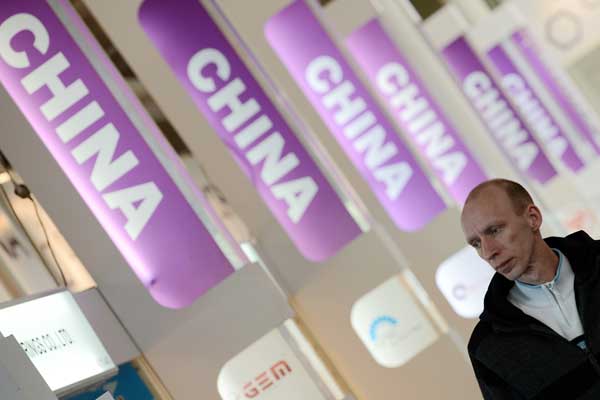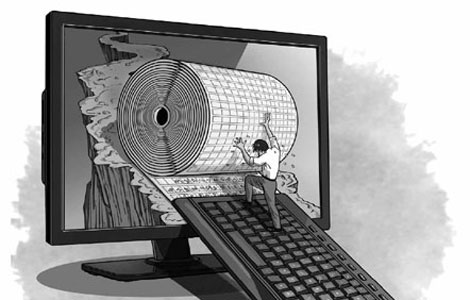China's investment a 'job-saver' in Europe
Updated: 2013-09-25 00:33
By Fu Jing in Brussels (China Daily)
|
|||||||||||
Surging investment from China helped create or preserve about 100,000 jobs in Europe during 2011-12, when the continent's economy was hit by a downturn, a report said.
The key finding is contained in the biennial Euro-China Investment Report from the Antwerp Management School in Belgium.
 |
|
The China pavilion at the Hannover Industrial Exposition in Germany. China has become the third-largest source of foreign direct investment in Europe. MA NING / Xinhua |
As of January 2013, there were 7,148 companies in Europe with Chinese investment that employed 123,780 people. A year earlier, there were only 4,525 such companies with 27,381 staff.
"We found that China's investment in Europe surged by almost any measure during 2011-12," said Zhang Haiyan, head of the research team and academic director of the university's Euro-China Research Center. "China's story of investment in Europe is still unfolding."
Zhang's team has long kept an eye on China's investment in Europe, especially since the turn of the century, when the Chinese government started to encourage its investors to "go global".
China's overseas economic activity gathered pace after the 2008-09 global financial crisis, while the European Union has experienced two recessions in the past five years. Seeking to understand the interaction of these trends, Zhang's team published the first China-Europe investment report in November 2011.
"Compared with the first report, we have drawn some very striking conclusions," said Zhang, who gave China Daily an exclusive look at the report ahead of its official launch on Thursday at a biennial EU-China forum in Antwerp.
In addition to a rapid rise in the number of Chinese-invested companies and their employees, Zhang said the assets of Chinese-invested companies have also soared.
In the first report, he calculated those assets at about 15 billion euros ($20.2 billion). As of this January, the figure stood at about 88 billion euros.
Zhang said his team's research was based on data from the Amadeus European Company Database, which contains comprehensive financial and business data on more than 19 million companies registered in 43 European countries.
Zhang said the database was probably incomplete, so the "economic map" of China's involvement in Europe was likely bigger and busier.
This year, China became the third-largest overseas direct investor, after the United States and Japan.
The gap between its outward and inward investment is narrowing. Some international organizations have forecast China will become a net investor by 2017.
More than half of the Chinese-owned companies in Europe are making a profit, according to the report while, by contrast, more than 80 percent of the European businesses in China are making a profit.
The difference probably reflects the worsening economic situation in Europe, Zhang said.
Zhang said that Chinese companies have intensified their cross-border merger and acquisition activity in Europe, targeting knowledge-intensive and high-tech manufacturing and services companies in West and North Europe.
Trade investigations have, in a way, propelled Chinese investment in Europe. Putting money directly into companies doing business there helps Chinese companies avoid tariff barriers, said Zhang.
Although China's potential future overseas investment is generally estimated to be very high, so far the country has only supplied a small part of the European Union's inward foreign direct investment.
The cumulative share of China in the EU's inward FDI stock from non-EU member countries was less than 0.4 percent in 2011.
"This extremely low percentage should certainly assuage the fears expressed by some politicians and media about the spreading influence of China in the European market and industries," the investment report said.
Paul De Grauwe, former economic adviser to the European Commission president, said the rapid increase of China's investment in Europe has reflected the impact of the country's economic restructuring, which focuses on domestic consumption.
De Grauwe, now a professor at the London School of Economics and Political Science, said that to satisfy its middle class, China will import more agricultural products and luxury goods from Europe.
To make the partnership more efficient, De Grauwe said: "Chinese businesses have chosen to directly invest in those European enterprises and this will continue."
Related Stories
Huawei to create 5,500 new jobs in Europe 2013-09-21 08:18
Rail route to Europe improves freight transport 2013-09-13 02:20
Today's Top News
Nobel economists rarely get to influence policy
Senate leader 'confident' fiscal crisis can be averted
Riding the wave of buy-ups
Working group to discuss sea issues
Chinese firm joins UK airport enterprise
Disaster response gets a helping hand
Have yuan, will travel far and wide
Draft regulation raises fines for polluters
Hot Topics
Lunar probe , China growth forecasts, Emission rules get tougher, China seen through 'colored lens', International board,
Editor's Picks

|

|

|

|

|

|





